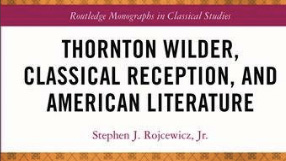Book Launch: THORNTON WILDER, CLASSICAL RECEPTION, & AMERICAN LITERATURE

Book Launch: THORNTON WILDER, CLASSICAL RECEPTION, & AMERICAN LITERATURE
Join Stephen Rojcewicz, Jr, Lincoln Konkle, and Judith P. Hallett as they discuss Rojcewicz's recent publication, Thornton Wilder, Classical Reception, and American Literature (Routledge, 2021). Judith Hallett will provide a Classics commentary and discussion and Lincoln Konkle will discuss the book from the standpoint of American Literature.
Judith P. Hallett is a Professor of Classics Emerita at UMD. She co-directed Rojcewicz’ 2017 PhD thesis with Jane Donawerth, Professor of English and Distinguished Scholar-Teacher Emerita at UMCP.
Lincoln Konkle is a Professor at the College of New Jersey and Board Member of the Thornton Wilder Society, as well as Co-Founder and Board Member of the Edward Albee Society.
From the publisher's website:
This book delineates how Thornton Wilder (1897–1975), a learned playwright and novelist, embeds himself within the classical tradition, integrating Greek and Roman motifs with a wide range of sources to produce heart-breaking masterpieces such as Our Town and comedy sensations such as Dolly Levi.
Through this study of archival sources and close reading, readers will understand Wilder’s avant-garde staging and innovative time sequences not as a break with the past, but as a response to the classics. The author traces the genesis of unforgettable characters like Dolly Levi in The Matchmaker, Emily Webb in Our Town, and George Antrobus in The Skin of Our Teeth. Vergil’s expression, "Here are the tears of the world, and human matters touch the heart" haunts Wilder’s oeuvre. Understanding Vergil’s phrase as "tears for the beauty of the world," Wilder utilizes scenes depicting the beauty of the world and the sorrow when individuals recognize this too late. Wilder exhorts us to observe lovingly, alert to the wonder of the everyday.
This work will appeal to actors and directors, professors and students in classics and in American literature, those fascinated by modern drama and performance studies, and non-specialists, theatre-goers, and readers in the general public.

